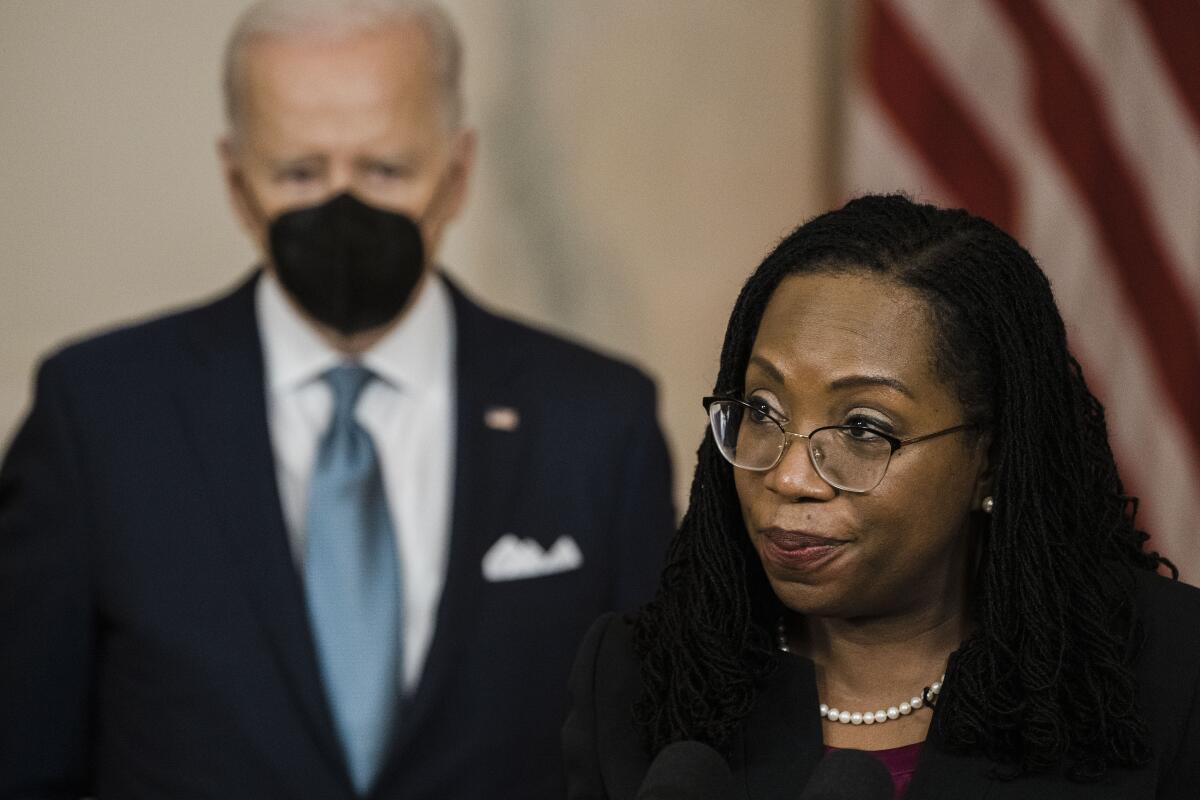Column: A person learns a lot while growing locs like Judge Jackson’s

- Share via
When a Black person starts growing locs, there is a period of time many of us jokingly call “the ugly stage.” The truth is, there is nothing ugly about it. That’s why I try to avoid using the word “dreadlocks.” There is nothing dreadful about my hair.
From my perspective, growing locs can be one of most beautiful periods in a person’s life. There is so much growth that can come from learning how to love one’s nappy and kinky hair in a world built around soft and silky.
It doesn’t matter why someone decides to grow locs — be it fashion, religion or politics — we all must be caterpillars before we become butterflies. That’s why we locs tend to acknowledge one another in public. We understand the intrapersonal work that goes into growing our natural hair. We too endured the looks. The jokes. Sometimes rejection.
I thought about that as I watched Republican after Republican try to break Ketanji Brown Jackson during her historic confirmation hearing. As her beautifully coiled sisterlocks glistened under the bright lights, perfectly framing the unbothered look on her face, I wondered what, if anything, she learned about herself during her hair’s “ugly stage.”
Jackson isn’t just a highly qualified Black woman. She’s a highly qualified Black woman with natural hair.
That’s a fireable offense in some parts of the country, and I’m not kidding.
Black women have been getting fired for daring to wear their hair without a relaxer or weave so frequently, legislation had to be written to protect them. This month, the Massachusetts House of Representatives unanimously passed a bill banning race-based hair discrimination, joining 14 other states.
Just days before Jackson’s hearing began, the U.S. House passed the Crown Act, short for Creating a Respectful and Open World for Natural Hair. Unfortunately, unlike in Massachusetts, the vote passed along party lines, both a reflection of our continual dissent into toxic partisanship and the long-standing discomfort some Americans feel toward natural Black hair.
Think about it: From the enactment of the tignon law in 1786, requiring Black women in Louisiana to cover their hair with scarves, to the 189 votes against the Crown Act, lawmakers have been trying to tell Black women what to do with their hair for 236 years.
And here in 2022 sat Jackson — relaxed shoulders instead of relaxed hair — skillfully answering non sequitur questions about racist babies while ignoring the blaring dog whistle in the room. The Washington Post compared her education and legal experience with that of the other justices in a graphic that quickly went viral because Jackson comfortably exceeded them all. Yet she had to sit there and answer questions about secret plans to insert critical race theory into the justice system from members of Congress who have shown little interest in investigating the no-longer-secret plan to overthrow our very democracy.
I wondered what she learned about herself as her hair was growing out and going through the ugly phase. What did she come to accept and what did she decide to let go? And how did that transition period prepare her for the moment she would find herself nominated to the very court that in 2018 rejected hearing a case in which a job offer was rescinded after the recruit, who was Black, refused to cut off her locs.
And 189 Republicans in the House are apparently OK with that. I wonder what formula that party employs to decide when it’s time for “my body, my choice” and when it’s not.
When President Wilson nominated Louis Brandeis to be the first Jewish person on the Supreme Court, in 1916, the controversy ran so hot that the Senate Judiciary Committee held the first public hearings with witnesses. From 1789 until 1916, no such hearing for the highest court in the land was held, but as soon as a Jewish man was nominated….
But that’s what we do, isn’t it? Find ways to other one another?
Skin color. Religion. Sexual orientation and gender.
When I was going through my so-called ugly phase, patience was my greatest lesson. I had to learn patience for myself, patience for family and friends who wanted me to comb my hair, and especially patience for a world threatened by the comfort I had in having oval hairs.
That’s one of the key differences between hair types: the shape of the strands. And over the course of hundreds of years, Black women have had the shape of their hair debated in Congress and at the center of state policy. When Viola Davis left her signature wigs at home and instead arrived at the 84th Academy Awards wearing her hair naturally, she was called brave.
That much fuss being made over the shape of her hair because the ideology of racism is that damn fragile. Now that’s power.
Maybe that’s what Jackson learned about herself during her “ugly phase” — just how powerful she really was.
More to Read
A cure for the common opinion
Get thought-provoking perspectives with our weekly newsletter.
You may occasionally receive promotional content from the Los Angeles Times.











